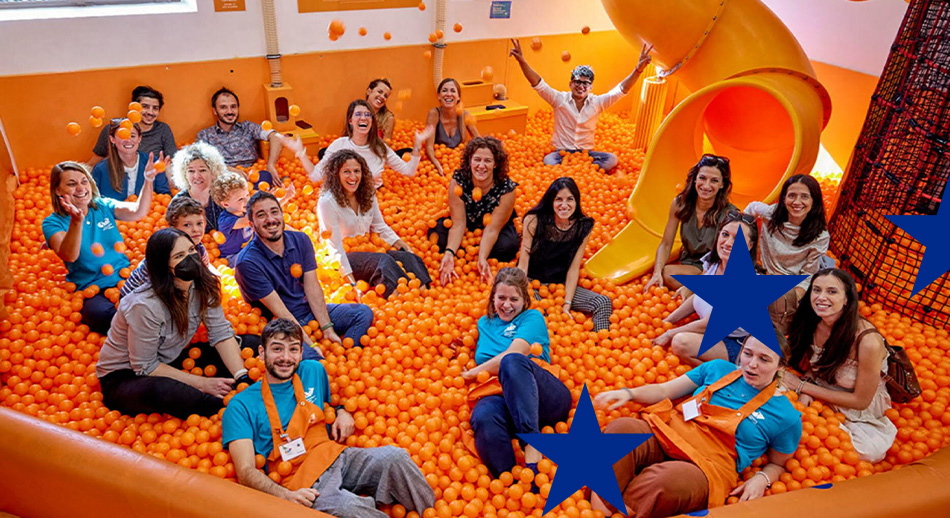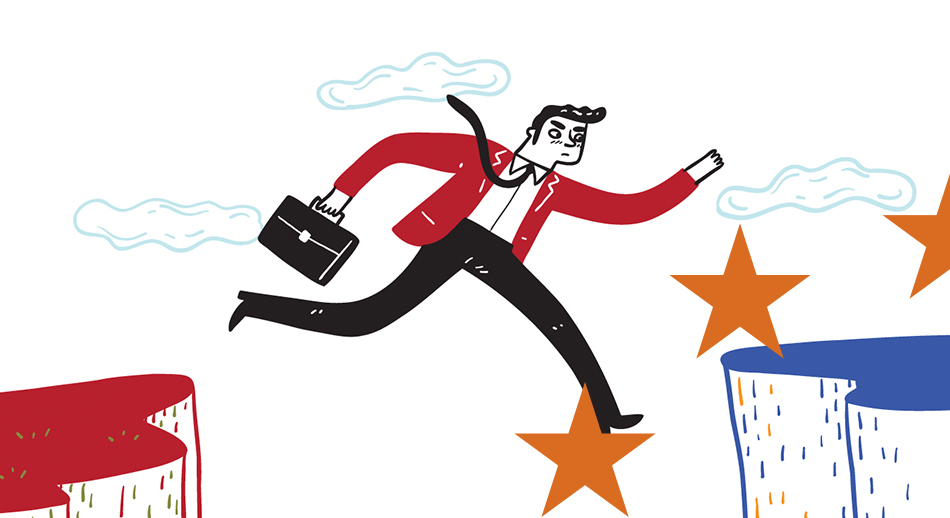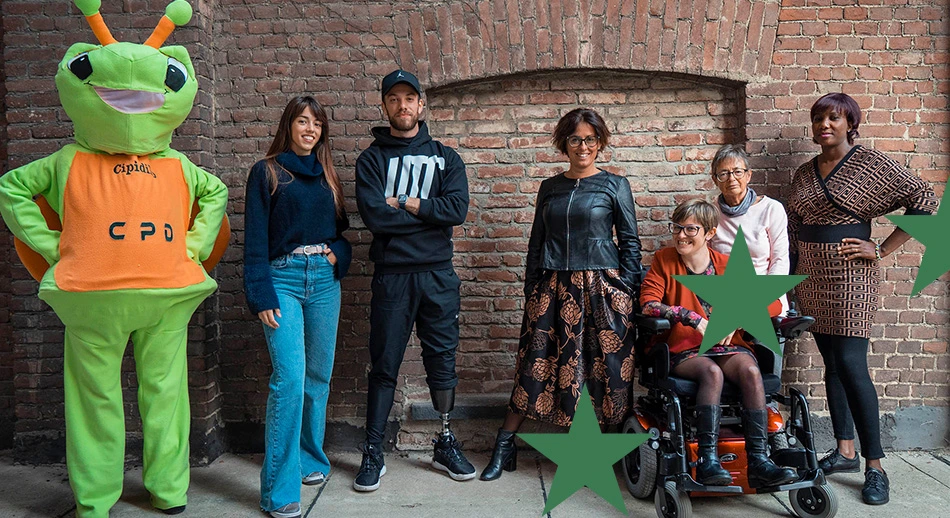Science and European projects, one and the same philosophy: play, discovery, enthusiasm, methodical dedication. Pleiades Group’s growth path.
Pleiades’ experience with the SfidEuropee project.
In a previous article of ours, we talked about the SfidEuropee project, a comprehensive pathway for accompaniment to europlanning promoted by the Fondazione Caritro, its counterparts the Bolzano and Verona Foundations, and a large group of partners (12 in all) in northeastern Italy.
In June we were able to get to know the participants in SfidEuropee, and today we report on the experience of Pleiades, a social cooperative that (like the star cluster of the same name) makes the spark of “STEAM” (Science, Technology, Engineering, Art and Math) shine in boys and girls. It does so through a playful and creative approach that uses curiosity as an engine of discovery and learning.
Pleiades is an organization born and raised with and for boys and girls. Founded in 2009, it now has a team of more than 20 people working to promote science education and outreach. It manages, among others, the “Children’s Museums” in Verona and Pompeii, (the latter in ATI with the AION Consortium), the Museum of Chemistry in Settimo Torinese, the didactics of the Museum of Natural History in Milan, theBotanical Garden and the Museum of Flight in Padua.
European projects are an integral part of Pleiades’ development path. European projects, like science, also require curiosity and a willingness to get involved; a dash of courage to get going; method and enthusiasm.
We spoke with Lucio Biondaro, vice president and CEO of Pleiades, who is responsible for the organization’s external relations and European activities. Surrounding us on the walls is a giant, colorful periodic table of elements.
1. Through what path did you approach European funds and europlanning?
Discovering and trying new paths is part of Pleiades’ philosophy: our job is to cultivate curiosity and the need to experiment. We apply this philosophy in different areas and are ourselves-operators and collaborators of Pleiades-first and foremost, curious and experimentalists.
The international dimension intrigued and inspired us from the very beginning: we have always been partners with two European organizations of reference in the field of science outreach, Ecsite (the European network of science centers and museums) and Hands On! (a network grouping 120 children’s museums in 40 countries).
The first international recognition was in 2020, thanks to a spontaneous and free project: the Galactic Guide to Coronavirus, the first in the world designed and written for children and parents. It has been translated into 32 languages, spread to 64 countries, downloaded and enjoyed by millions of people. Ambassadors, mayors, international universities and the Presidency of the Republic have recognized its value and contribution. It was born out of a desire to do something good for the world at a difficult time.
So when we approached European projects a few years ago, we did so with some experience and knowledge of the way of thinking and working in our field in other countries. We left having a small “briefcase” of content and reports.
Our history with European projects has followed the “experimental” slant we apply in our activities. We embarked on a project to which we were invited as partners, then we tried others, and most importantly we joined SfidEuropee, a very important step in consolidating and “giving method” to what we had begun to experiment with. With SfidEuropee, we gained the tools to move in an organized and knowledgeable way in the world of European projects. We have structured ourselves internally and are working on new projects. And here we are today: just a few days ago we told the “new recruits” of the SfidEuropee project about this experience.
2. What European fund lines have you had the opportunity to work on and with what results?
We have always worked so much on calls and projects of all kinds. Although not always perceived, European projects have many things in common with other types of calls or projects, locally or nationally funded, in which any association normally participates. But our history on European projects proper is quite recent: it is because of this “freshness” of ours that we want to convey the message that even a small organization, with a small staff engaged on a thousand fronts, can make it and can learn and grow through European projects.
Our first European project started in 2022 and is still ongoing. It is a Creative Europe project: it is called TOMATO, which stands for “The Original Museum Available To Overall.” The partnership includes 13 partners from eight countries (Italy, Greece, Czech Republic, Belgium, Romania, Croatia, Slovenia and Austria) and is led by the Greek organization K.A.N.E.
Aimed at bringing the youngest children closer to the rich heritage of museums in their home countries, it aims to reach 350,000 boys and girls, especially from physically and socially disadvantaged backgrounds, through 1,000 “Tomato Kits” that repurpose the works in a playful way and through interactive, fun and stimulating ways. The kits are accompanied by pedagogical and educational manuals and are also declined digitally through an app.
This first experience definitely inspired us and we decided to devote ourselves in a more organized and systematic way. We started with an Erasmus+ KA210 Small scale project entitled WISE (What Is the best way to teach Science? Bring ELS methodology into your classroom). It was not successful, but doing so allowed us to create a strong partnership with which we participated in another Erasmus+ KA220 Cooperation, the results of which we are awaiting.
We then decided to consolidate this experience by participating in SfidEuropee, which gave us the tools to move forward. We worked on another Creative Europe project by proposing ourselves as the lead partner. The project applies our method to nutrition education for boys and girls, and we are waiting for evaluations.
On the design aspects our organization is growing. We have a staff of 20-25 people, mostly dedicated to developing content and managing outreach activities in schools and museums-mostly in the four museums we manage directly to date. We have recently formed a Calls Office that now houses three people, who are involved in scouting, opportunity research and project preparation, as well as administrative, reporting and analytical aspects. It is very important to us, and we think this development is a good idea for third sector organizations: in addition to European calls, there are always opportunities to look for, build and follow up on.
3. What are the main difficulties you encounter in submitting projects?
The main difficulty is time: calls for proposals always come with a deadline, and it is complex for a small organization to prepare to be able to handle all the necessary aspects of a European project, such as partnerships, content, calls for proposals, and administrative aspects, on time.
Another major difficulty is partners: they are an essential ingredient in projects, and you need to find partners who have the right size, who have a concrete interest and added value on the issue you are going to develop, who ensure good geographic coverage–a big puzzle for which you need a lot of contacts and good relationships. A puzzle that does not always succeed in the time and manner assumed.
One difficulty we are encountering now is one related to skills: we are structuring ourselves with people with the right profile, but participation in a European project is a process that affects the whole organization, particularly if it is small. All staff need to gradually build up all the skills necessary to integrate best into the project, such as in terms of English proficiency and management of administrative and reporting aspects. This requires an attitude of continuing education on everyone’s part.
A final aspect to pay attention to, which is not minor, is economics. Even a social enterprise such as ours is first and foremost an enterprise that must be able to stand on its own feet economically. We took the path of European projects because they give a promising boost at the level of developing content, approaches, contacts and new business opportunities. Keeping in mind that a larger project corresponds to a longer time between proposal and return on investment, one must be able to do the math well. That is why we have included an economic analysis function in our Call Office.
4. What is most helpful to you and what would you recommend to someone who wants to submit a project with European funds?
First of all, especially in the initial stages when we needed to understand how the world of EU projects and funding worked, the Guide to EU Projects and Funding served us well and helped us. It is a very simple but functional tool to those who want to understand, inform themselves and consult the most important documents. Official EU portals, program guides, and platforms for information and inspiration on submitted projects are also helpful, both in understanding and in gathering ideas and possible partners.
As mentioned earlier, SfidEuropee was a key stage in this journey for us. It allowed us to give order and method to elements that had previously been addressed “in no particular order,” and fill in some “holes” that were undermining our understanding and – consequently, our action on European projects. After a more formative first part, a second part of orientation and accompaniment allowed us to test and consolidate on a “real project” what we learned. And SfidEuropee also helped us with a small stimulus grant to participate in the project. From this experience we began to structure ourselves and have come to–today.
Building relationships with other organizations, in Italy and outside Italy, has definitely been another key aspect in our journey. We have accomplished this both by frequenting our referral networks and by rolling up our sleeves in our business, maintaining an attitude that is always open, curious and collaborative.
Finally, the creation of a group dedicated to calls for proposals: this seems to us to be a strategically and economically challenging (especially for a small organization), but successful choice to effectively approach European projects.
We therefore offer these insights derived from our small experience to those who wish to approach European projects: develop a European thought and vision, even by associating with their reference association; find partners and develop relationships; inform themselves about the many tools available, such as this Guide, remaining open, curious and predisposed to seize opportunities; get involved in a first project, even with a small role and a small budget, to experience its difficulties and potential; be wary of an overly theoretical approach, because theory often “scares” more than it needs to; provide a time for training and accompaniment, such as SfidEuropee, to consolidate what has been learned through experience; consider setting up a group that specializes in identifying opportunities and working on calls and projects.
Our experience confirms that it is worth it. Good luck to everyone!




